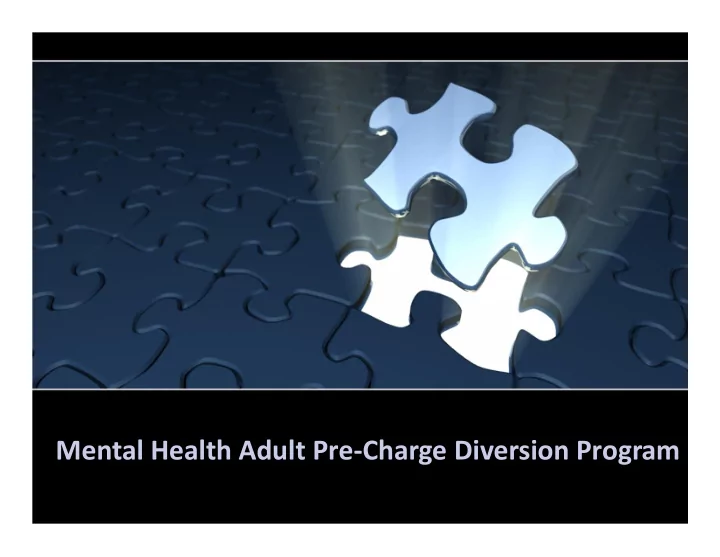

Mental Health Adult Pre-Charge Diversion Program
Agenda Why Pre-Charge Diversion? Item 1 Item 1 Program Development Item 2 Item 2 Program Description & Criteria Item 3 Item 3 Service Process Item 4 Item 4 Outcomes & Future Plans Item 5 Item 5 Questions & Answers Item 6 Item 6
Why Pre-Charge Diversion?
Why Pre-Charge Diversion? The Mental Health Perspective The Police Perspective • Client directed to appropriate • Reduced calls for police services service • Early intervention and linkage • Reduced load on court system • Opportunity to engage clients • Positive police contact for the we might not otherwise see client and their family • More effective symptom • Accountability management and reduced recidivism
Program Development, Description, and Criteria
Program Development • Direction came from Durham’s HSJCC • Partnership developed: • Durham Regional Police Service (DRPS) • Durham Mental Health Services (DMHS) • Crown Attorney’s Office • Program began as a Whitby-focused pilot in September 2009 • In 2010, program was implemented region-wide
Program Description • Voluntary program • Provides support to individuals who have been identified by DRPS as appropriate for diversion to health and human services before being charged with a criminal offense • Average length in program is 3-6 months
Program Criteria • Evidence that a minor criminal offense has occured • Client appears to be or known to be experiencing a mental health disorder • Client commits to meeting DMHS Community Mental Health Worker once per week (voluntary) • The Police Officer handling the case believes that the offender would benefit from this program • A victim does not require protection • 18 years +
Offences but not limited to…. • Theft under $5000.00 • Take motor vehicle without consent • Possession of stolen property under $5000.00 • Mischief • Fraud under $5000.00 • Minor drug possession • Passenger in a stolen auto • Weapons Dangerous • Assault
Service Process
Intake and Assessment • DRPS officers identify potential clients • Clients have seven days to attend a Pre-Charge Diversion Intake at 150 Bond St, Oshawa • DMHS Mental Health Court Support Worker completes assessment and reviews program expectations • Service plan is developed • DMHS Case Manager follows through on service
Client Accountability • Timeframe for service is established early on • More severe offences or needs mean longer service • If the client fails to • If lack of follow through • DRPS is contacted upon follow through on continues a case conference successful completion of program expectations, is arranged between: program Police contact the • Crown Attorney client to remind them • Durham Regional of their obligations Police • Durham Mental Health Services • Criminal Prosecution may proceed
Outcomes and Future Plans
Outcomes • Referrals • Successful program completions • Police awareness training • Feedback from Officers, clients and service providers
Challenges • Is the person able to appreciate and understand what they’re signing? Meet the criteria under section 17 of the MHA? • Clients out of Region or north Durham • Clients without transportation • Balancing administrative duties for the Pre-Charge Program • Acceptance at the Policing level
Future Plans • A MCIT Coordinator to handle the cases and training frontline Officers and new recruits • Increase the utilization of the program throughout Durham Region • Continuing to adapt to client needs, expanding capacity where possible
Questions
Contact • Cst. Scott Logan #3386 – Durham Regional Police • 905-579-1520 ext. 1765 • Valerie Mussington – Durham Mental Health Services • 905-743-9384 • Yolanda Diston, RN – Durham Mental Health Services • 905-244-5028 ext. 3251
Recommend
More recommend